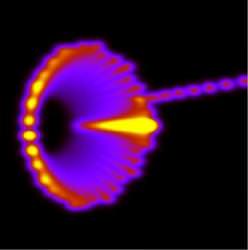The scientific consensus is that the Universe is expanding, having gotten its start in a single point 13.7 billion years ago. There are several lines of evidence to support this theory: the movement of galaxies away from us, the cosmic microwave background radiation, and the quantities of hydrogen and helium in the Universe.
But what came
before the Big Bang
? Since all matter and energy was tangled up into a single point of infinite volume and density, it's hard to imagine how you could look to a time before that.
Cosmologist Martin Bojowald and others from Penn State University thinks it's possible. His ideas are published in a new paper as part of the July 1st edition of the journal Nature Physics.
According to Bojowald, a mathematical technique called Loop Quantum Gravity, which combines relativity and quantum mechanics, gives a different view of the early Universe. Instead of being infinitely small and dense, it was compacted down into a ball of some volume and density.
The researchers believes that a previous Universe collapsed down to a tiny ball, and then had a Big Bounce to expand again. The previous Universe was very similar to the space-time geometry we have in our current Universe.
I'd try and explain this better, but Phil beat me to the punch and
did a great article
about it.
Original Source :
Penn State University
 Universe Today
Universe Today
